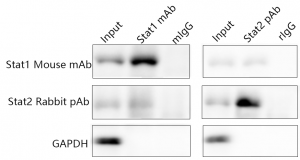What is IP (immunoprecipitation) / Co-IP (co-immunoprecipitation)?
1.What is IP (immunoprecipitation) / Co-IP (co-immunoprecipitation)?
Immunoprecipitation is a method of protein purification. The antibody of the target protein is incubated with the cell extract to bind the antibody to the protein in the solution, and then the antibody / antigen complex is separated from the solution by the agarose beads coupled with protein A big G. finally, the target protein can be separated from the complex sample by SDS-PAGE, and the sample can be used for Western blotting analysis. Co-IP is an extension of immunoprecipitation and is mainly used to detect protein-protein interaction.
2.What are the advantages of co-immunoprecipitation?
- The target protein is pulled down in its natural state, thus reducing the influence of human factors;
- Complete protein complexes can be obtained, which is very useful for the characterization of proteins and their functional pathways;
- Highly compatible with a variety of sample preparation and protein identification methods;
- The operation is simple and clear.
3.Common problems and solutions for immunoprecipitation (IP)
Common problems of immunoprecipitation are mainly high background and no target protein detection:
1)High background
a. The washing is not enough
Solution: When adding detergent to wash, the pipe cover should be turned upside down several times, the action should be gentle, but the number of times should be guaranteed, and then put into the centrifuge;
b. Detergent insoluble protein residue
Solution: Add the loading buffer, cook for about 5 minutes, then centrifuge, aspirate the supernatant for WB;
c. Non-specific protein binding to beads
Solution: The beads should be fully pre-sealed with BSA to ensure that the BSA is fresh. The specific method: incubate fresh agarose beads in 1% BSA (dissolved in PBS) for 1 h, and then wash them with PBS 3-4 times before use;
d. Insufficient antibody specificity
Solution: Use antibodies that can be used as IP, read the literature and buy antibodies suitable for IP, and carry out IP according to the amount of antibodies reported in the literature;
e. Excessive antibodies cause non-specific binding
Solution: When the direct binding of the general target protein is stable, reduce the amount of antibody used;
f. The protein concentration in the protein sample is too high (especially when the cell line is transfected to overexpress two proteins)
Solution: The lysate was used to dilute the protein sample properly, or the cell line expressing the target protein could be selected. Without transfection, the protein could be collected directly for IP;
g. Antigen degradation during IP
Solution: Be sure to add appropriate protease inhibitors to the lysate, especially for proteins containing multiple groups (such as glycosylation), and more attention should be paid to operation on ice and centrifugation at 4 °C.
2) No target protein detected
- If the cell or tissue sample used does not express this protein or has a low expression of this protein, it can be replaced with a cell line or tissue with high expression of this protein, and IP can be carried out again.
- The antibody is added too little, so that it can not bind to more antigens, so the antibody concentration should be increased.
- The target protein has not been eluted from the beads, at this time, we should first determine whether the quality of the elution buffer is good, and we can try other detergents.
- The cell or tissue is not lytic completely or not at all. At this point, the cracking liquid should be checked to see if it has failed, and it can be reconfigured before IP.
- The antibody is not bound to the beads. At this time, make sure that the beads used are consistent with the antibody subtype.
- Recommended Products
Based on the cumbersome and time-consuming operation of traditional IP/Co-IP experiments, a wide variety of reagents, and poor stability and reliability of experimental results, Abbkine has developed a universal and standardized immunoprecipitation (IP/Co-IP) toolbox. It can meet the needs of most users and is the best choice for IP/Co-IP testing experiments.
Unique advantages:
- Efficient: Efficient antibody binding capacity and low protein non-specific adsorption rate, saving antibody consumption.
- Convenient and universal: Contain all the necessary buffers needed for IP/Co-IP and WB experiments, it can meet the requirements of sample IP/Co-IP or WB at the same time.
- Reliable and stable: It contains ready-to-use IP negative control, which can eliminate the non-specific binding of IgG itself to the target protein or other specific biomolecules to ensure the specificity of IP antibodies, and contains unique IPkineTM secondary antibodies to perfectly eliminate heavy chain interference.

Protein was extracted from the non-denaturing Lysis Buffer, then it was verified by Co-IP. While the whole cell lysates (Input) and Co-IP samples were validated with Stat1 monoclonal antibody, Stat2 polyclonal antibody, and GAPDH monoclonal antibody respectively by WB.
Related Products:
| Name | Cat |
| Universal IP/Co-IP Toolkit (Magnetic Beads) | KTD104-EN |
| Universal IP/Co-IP Toolkit (Agarose) | KTD105-EN |

Cell and protein research tools
Abbkine focuses on the fields of proteinology and cytology, and is committed to the innovation and research and development of various antibodies, proteins, analytical reagents and kits, in order to become a key promoter in the development of life science research, drug development and other fields. We provide you with the favorite products of protein and immune research users, from basic immunological products, such as protein extraction and quantification, to internal reference label antibodies, primary antibodies and secondary antibodies for immunological experiments; the favorite products of cell research users, from Dyes and kits for detecting cell status, organelle extraction kits, cell substructure staining and tracking and cell metabolism detection products, to cytokine and protein detection kits for cell culture, just to help your research career !











